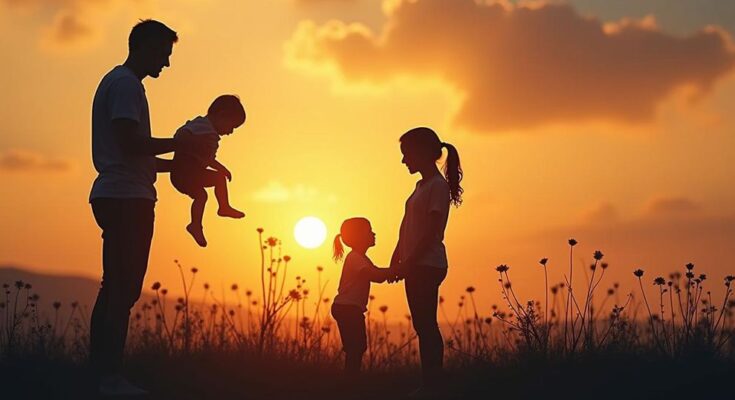The article examines the pressing question of whether to have children in the context of environmental degradation, economic instability, and societal implications. It presents two main environmental arguments against procreation focusing on the carbon footprint of additional children and the ethical implications of bringing a child into a climate-damaged world. It contrasts these concerns with the necessity of population growth for economic stability, particularly in countries facing declining birth rates. Ultimately, the decision to have children entails personal considerations intertwined with broader global challenges.
The question of whether or not to have children has ignited considerable debate, particularly in light of contemporary challenges such as environmental degradation, economic uncertainty, and societal implications. On a long flight sitting adjacent to a distressed infant, one may ponder the necessity of procreation. While having children is fundamental to the continuation of human existence and societal structure, the implications of adding new members to our species warrant careful consideration. From an environmental perspective, two principal arguments advocate against having children. First, the carbon footprint associated with one additional child is substantial. According to various studies, if individuals were to refrain from having just one child, the reduction in carbon emissions would be significant. Some proponents of this argument maintain that future generations could benefit from stricter policies that mitigate their environmental impact, assuming those policies are enacted effectively. However, skepticism is warranted, as evidence suggests that many nations are struggling to adhere to established emissions targets, such as achieving net-zero emissions by 2050. Furthermore, these targets may fall short in preventing catastrophic global warming. The urgency of reforming economic systems and personal lifestyles becomes increasingly apparent, yet the speed of such transformations is often insufficient. The second environmental argument against having children is grounded in the ethical implications of bringing a child into a world fraught with climate-related catastrophes. Critics argue this perspective is not merely alarmist but rather a realistic assessment of coming hardships. There is undeniable evidence that climate change disproportionately affects the underprivileged, as illustrated by a 2022 report linking extreme heat to nearly 62,000 deaths in Europe and severe flooding impacting 5.7 million individuals in Bangladesh. Despite the current challenges, the youth of today are fervently advocating for environmental reform, potentially paving the way for positive change. If humanity were to cease procreation entirely, extinction could become a tangible threat. Nevertheless, the likelihood of extinction owing to climate change seems remote. Young people are increasingly tackling climate issues and seeking innovative solutions to global challenges. Conversely, the notion of overpopulation remains a compelling concern that influences the decision to abstain from parenthood. With a global population surpassing 8 billion, the demand on natural resources is escalating, contributing to deforestation and water scarcity. Historical evidence reveals that rainforest coverage has diminished from 14% down to just 6%, underscoring the need for better resource management. On the other side of this issue is the phenomenon of population decline, or birth dearth, where many nations struggle to achieve a replacement fertility rate of 2.2 children per woman. Countries such as Japan are experiencing alarming fertility rates, necessitating greater immigration to sustain economic stability. Efforts to boost birth rates through pronatalist policies have proven ineffective and highlight the importance of immigration as a solution to demographic challenges. Underprivileged communities often experience strain from high fertility rates, leading to insufficient resources for basic needs such as food, education, and healthcare. Historical interventions, such as China’s One-Child Policy, while meant to mitigate population growth, have resulted in unintended negative consequences, including gender imbalances and social unrest. In conclusion, the decision to have children involves a complex interplay of personal, environmental, economic, and social considerations. While children undeniably play a critical role in sustaining society and the economy, it is imperative that the choice to become a parent is made freely and thoughtfully. The future should focus on sustainable solutions to global challenges rather than a mere increase in population.
The discourse on whether to have children or not taps into various critical issues impacting society today. From environmental challenges presented by climate change to economic pressures stemming from overpopulation and declining birth rates, prospective parents grapple with significant considerations. This juxtaposition involves weighing the necessity of continuing human life against the actual implications of that choice, especially in an age where resources are increasingly scarce and the planet is under threat from human-induced change. Moreover, historical approaches to population control have shown complex results, impacting societal structures and gender balances.
Ultimately, the exploration of whether to have children reveals a multifaceted discussion that transcends individual desires, addressing ethical, environmental, and economic concerns. While the continuation of humanity relies on procreation, making informed, conscientious decisions about parenthood is pivotal in navigating the pressing challenges we face globally. Emphasizing sustainable practices and innovative solutions may yield a brighter future, irrespective of family size.
Original Source: www.thegazelle.org




